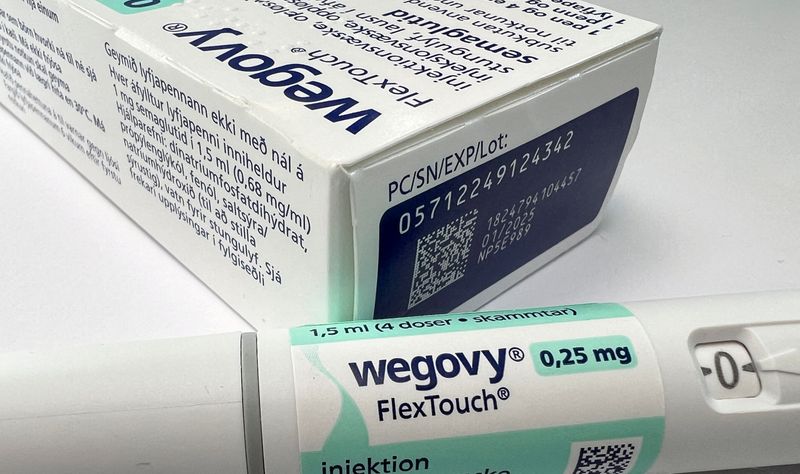By Maggie Fick
LONDON (Reuters) - Contract drug manufacturers seeking to tap into the booming market for weight-loss drugs are investing billions of dollars to expand or build factories that fill the injection pens used to administer treatments like Novo Nordisk (NYSE:NVO)'s Wegovy.
Interviews with a dozen company executives, analysts and investors showed pharmaceutical services companies jostling to secure more of the specialist work of filling the syringes used in the pens, a process known as fill-finish.
"Every contract manufacturer that has sterile fill-finish capacity wants to add more, to get ahead, because it's not just about Wegovy anymore," said Tejas Savant, senior healthcare equity analyst at Morgan Stanley. "You also have Lilly’s Mounjaro coming, and others."
Sales of Wegovy, the first of a new generation of obesity treatments which mimic the body's appetite-suppressing hormones, have soared since its launch in the United States in June 2021.
Eli Lilly (NYSE:LLY)'s Mounjaro is expected to be approved for weight-loss in the United States this year.
The weekly weight-loss injections belong to a class of drugs known as GLP-1 agonists, which analysts estimate could be worth as much as $100 billion within a decade, including oral treatments now being developed by Pfizer (NYSE:PFE) and others.
WuXi Biologics (HK:2269) CEO Chris Chen told Reuters his company is talking to clients about using pre-filled syringe capacity it is installing at a German factory it bought in 2020.
Describing interest as "pretty high", he said he wants to buy more factories in Europe to serve GLP-1 customers, but did not give details.
Catalent (NYSE:CTLT) is building "significant" pre-filled syringe capacity at factories in Anagni, Italy and Bloomington, Indiana, in the United States, said Cornell Stamoran, its vice president of corporate strategy and government affairs. They will come online in 2024.
The U.S. company already does Wegovy fill-finish work.
The race for business among contract development and manufacturing organisations (CDMOs) began last year. Since then, about half a dozen projects worth at least $3 billion have been announced by companies including Lonza, Fujifilm Diosynth Biotechnologies, a subsidiary of Fujifilm Corp, and Germany's Vetter.
And with Lilly preparing to launch Mounjaro and Novo struggling to meet demand even as it rolls Wegovy out in more markets, the pace is accelerating.
Another Novo partner, Thermo Fisher (NYSE:TMO) is converting facilities used to fill COVID-19 vaccine syringes to handle pens for obesity and diabetes medicines, CEO Marc Casper told a Morgan Stanley health conference last month.
He said there was a huge shortage of capacity. A company spokesperson declined to comment.
All the companies interviewed by Reuters declined to disclose terms of potential contracts or customers.
FROM COVID TO OBESITY
Big drugmakers hire CDMOs when they lack in-house expertise or scale. Filling syringes is done in sterile conditions to avoid contamination before pens are assembled and packaged, and then shipped by wholesalers to pharmacies and clinics.
Novo is spending billions to increase its own Wegovy output and plans to add more contract manufacturing sites in addition to three run by Catalent and Thermo.
Even so, shortages will last into next year.
Lilly is also increasing internal capacity, but for now is using an "extensive portfolio" of CDMOs, a spokesperson said, without naming them. Trials of its drug Mounjaro showed higher efficacy than Wegovy.
Research firm The Insight Partners predicts the fill-finish market will more than double between 2019 and 2027, to $12.5 billion. That is about twice the pace for tablets or capsules, an industry expert said.
New GLP-1 business could more than offset the loss of COVID-19 vaccine contracts, executives said.
The U.S. Inflation Reduction Act is also boosting development of biologic drugs, some of which are injected. Injectables are increasingly used in elderly care settings, and some new Alzheimer's and generic arthritis drugs are administered by injection.
But GLP-1s are the leading reason for investments, companies said.
Many projects will only complete next year or in some cases in 2026, meaning supply constraints are likely to persist. One healthcare investor said CDMOs' ability to boost capacity will determine how fast the obesity drug market grows.
In the meantime, Catalent and Thermo are "in the catbird seat" leading the market due to their existing capabilities, said Barclays analyst Luke Sergott.
Catalent shares currently trade at around 42 times expected earnings over the next 12 months, according to LSEG data - more than 28 for Lonza and 21 for Thermo, reflecting its current dominance in the obesity race despite some quality issues. Reuters reported in July that quality lapses at Catalent's Brussels factory had caused Wegovy shortages.
Executives said the scramble for capacity would not create a surplus.
"CDMOs don't follow a 'build it and they will come' model, based on my 30 years in the industry. That's not how you build a CDMO business to last," Catalent's Stamoran said.
Keep up with the latest medical breakthroughs and healthcare trends with our newsletter Reuters Health Rounds. Sign up here.
